The tragic flooding in Texas has sharpened scrutiny of whether the government is sufficiently prepared to save lives and manage natural disaster-driven emergencies.
New national polling from Change Research in June and July 2025 shows that most Americans don’t think so. While the Trump administration has made cuts to federal agencies like the National Weather Service (NWS) and the National Oceanic and Atmospheric Administration (NOAA), there are strong public expectations for both federal and state leadership on disaster response and climate preparedness.
Heavy Storms, Heavy Partisanship
With extreme weather events frequently making headlines, most Americans believe they’re becoming more common, with many connecting the trend to climate change. In a June survey, 64% of Americans perceived an increase in the frequency of extreme weather events such as tornadoes, hurricanes, and wildfires.
When asked how much climate change has contributed to extreme weather events becoming more frequent, 72% responded “a lot”. More broadly, 58% of Americans reported being concerned about climate change, with 38% saying they’re “very concerned.” The issue divides sharply along party lines: 94% of Democrats express concern, compared to just 21% of Republicans.
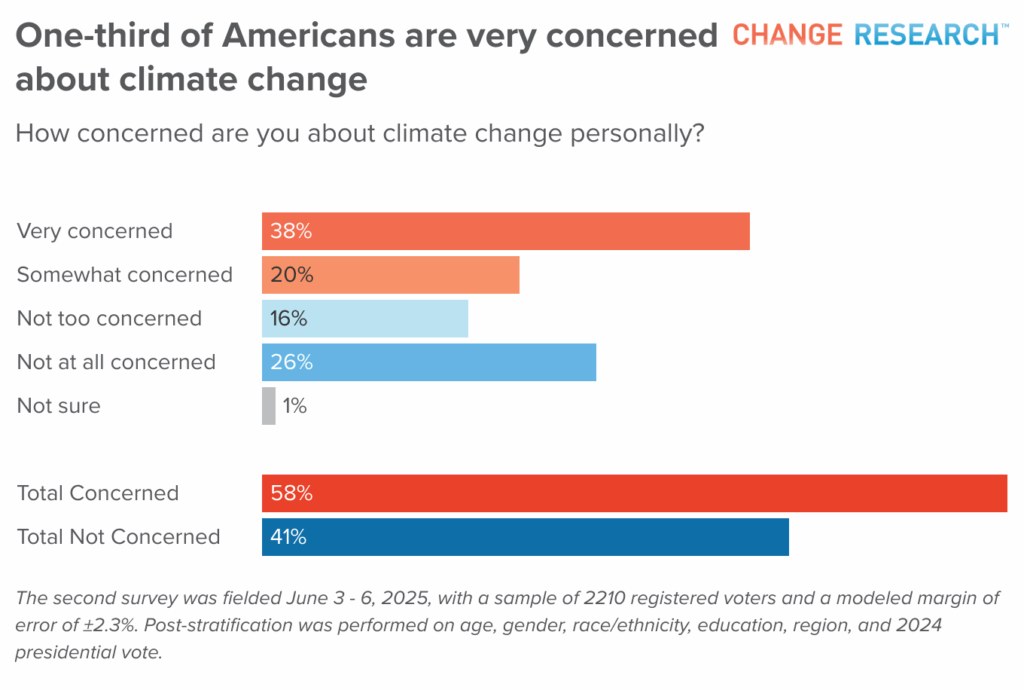
Disaster Response: Not Meeting the Moment
Across both our June and July surveys, Americans indicated skepticism about the government’s handling of extreme weather events. In the July survey, just 22% rated the U.S. government’s disaster response over the past year as good or excellent, while 46% rated it poor or very poor. In June, we saw similar findings with only 19% giving positive marks to the government’s response to tornadoes and severe weather.
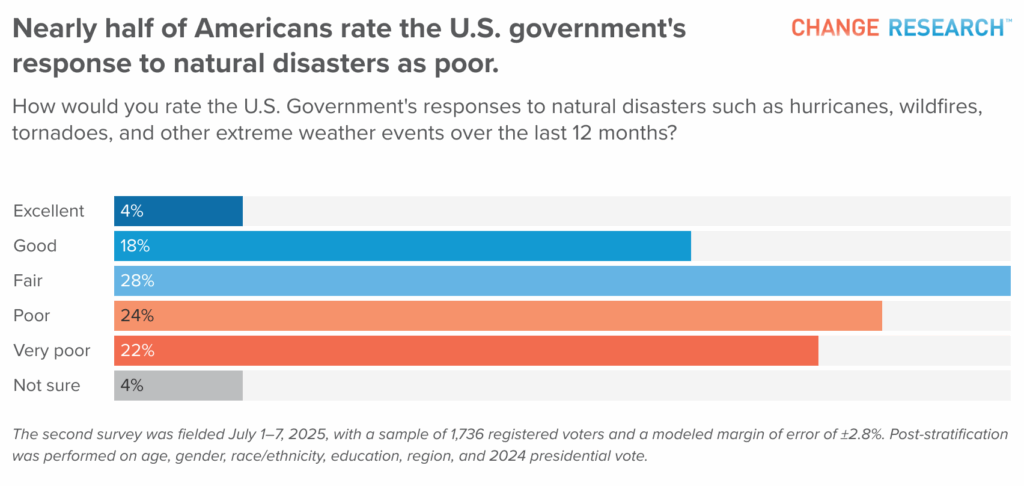
For many, this is more than an abstract concern. Seventeen percent of Americans say their household has been directly impacted by a natural disaster or extreme weather event in the past year. Among them, over half (52%) described it as a moderate or major problem.
Voters Expect Action—At Every Level of Government
What do Americans want? More help. In July, 73% say the government isn’t doing enough to help people affected by natural disasters, including 87% of Democrats, 75% of independents, and 59% of Republicans.
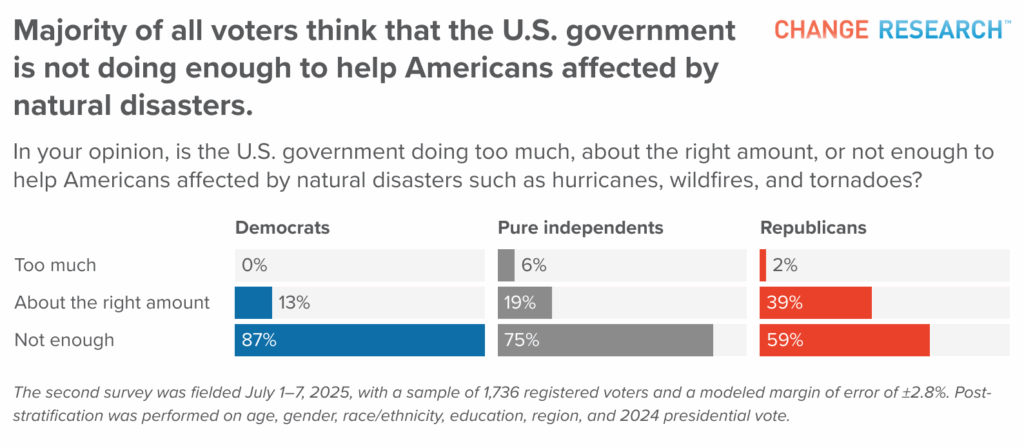
In July, 54% of Americans said the U.S. government should bear “a great deal” of responsibility for responding to natural disasters. Another 36% said it should bear a moderate amount. Just 10% said it should bear little or no responsibility. Americans assign significant responsibility to all levels of government. In addition to expecting the federal government to act, 74% of voters believe that a great deal of responsibility falls on state governments, and 69% say the same of local governments.
Support for federal involvement cuts across party lines, with 66% of Republicans, 88% of independents, and 97% of Democrats saying the federal government should bear at least a moderate amount of responsibility.
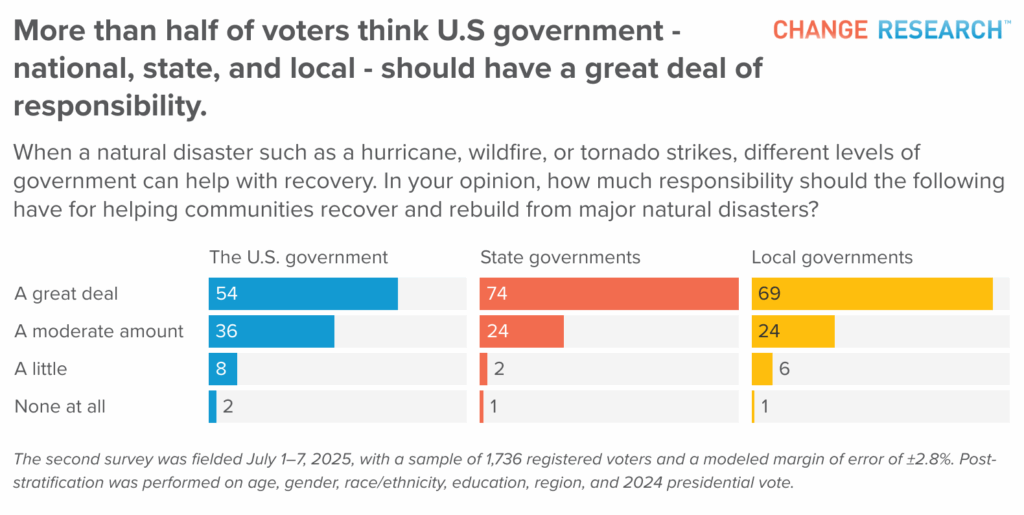
There is agreement across Democrats, Independents, and Republicans that the local government should have a great deal of responsibility (64%, 69%, and 75% respectively). Americans are more divided on whether the federal government should bear a great deal of the responsibility (71%, 48%, 37% respectively).
Americans support a robust federal disaster response:
- 98% support sending emergency supplies
- 91% support deploying federal personnel or the military to disaster zones
- 80% support federal assistance to rebuild homes and infrastructure
- 68% support direct financial assistance to families
Public Opposition to Cuts Is Consistent
Proposed cuts to NOAA and the National Weather Service, floated as part of President Trump’s budget priorities, are unpopular. In June, 62% of Americans indicated they oppose cuts to those agencies, including 51% who say it’s a very bad idea. Just 29% support the cuts. Republicans mostly supported the cuts (58%), but more than a quarter (28%) oppose them.
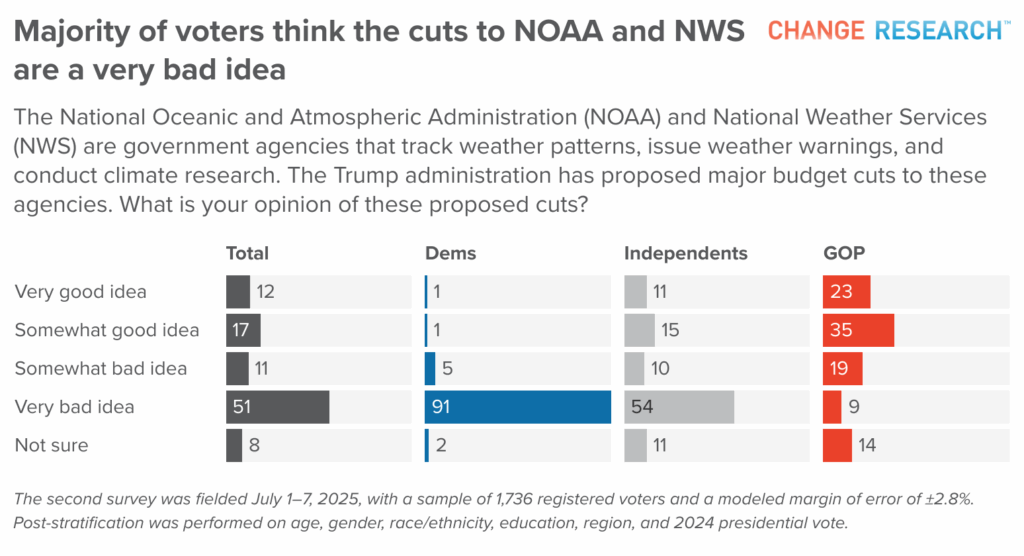
A similar trend held in our July poll: 56% of Americans opposed cuts to climate change and clean energy research, while only 29% supported those cuts. The intensity of opposition is noteworthy, especially among Democrats, where 91% oppose and 76% say the cuts are a very bad idea. Among Republicans, support is strong but far from unanimous: 58% support the cuts, but nearly a quarter (24%) oppose them.
The Bottom Line
Americans see natural disasters as a serious and growing threat, and they want governments at all levels to be prepared to help. In two surveys, majorities expressed concern about extreme weather, skepticism about the government’s response, and support for continued investment in forecasting and preparedness.
Polling was conducted online by Change Research using Dynamic Online Sampling to attain a representative sample of likely 2026 voters nationwide. The first survey was fielded June 3–6, 2025, with a sample of 2,020 registered voters and a modeled margin of error of ±2.7%. The second survey was fielded July 1–7, 2025, with a sample of 1,736 registered voters and a modeled margin of error of ±2.8%. Post-stratification was performed on age, gender, race/ethnicity, education, region, and 2024 presidential vote. Change Research is a member of AAPOR’s Transparency Initiative. As participants, we disclose all relevant details about our research so that the public can evaluate and understand the findings. This helps foster accountability and restore public confidence in polling.
